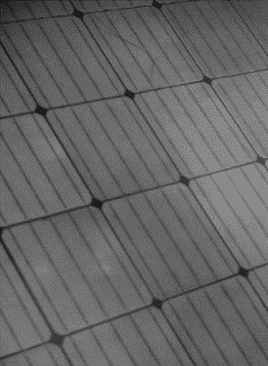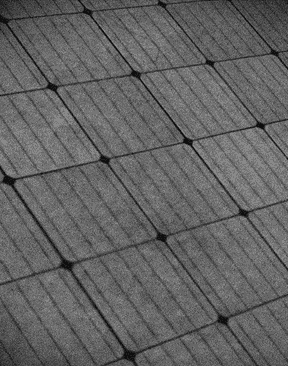Classic electroluminescence image of a solar module in the laboratory. At the top right you can see a crack in a solar cell. (Image: ISFH – Institute for Solar Energy Research GmbH)
The research project for the cost-effective inspection of industrial PV systems officially began on February 1, 2024. Under the title ‘Cost-effective inspection of industrial PV systems through self-sufficient and daylight-capable drone electroluminescence measurements (AUTAGDRONE)’, the ISFH – Institute for Solar Energy Research Hamelin will further develop electroluminescence measurement in cooperation with Aerial PV Inspection GmbH.
Due to the falling costs of PV systems, it is crucial to minimize inspection costs as well. The AUTAGDRONE project aims to further accelerate the electroluminescence (EL) inspection method in order to be able to withstand the cost pressure. To this end, electroluminescence measurement is being carried out for the first time using an automated drone that works efficiently not only at night but also during the day. The AUTAGDRONE project includes the development of automated drone control and a new type of measurement technology that enables daylight EL measurements without the drone having to remain stationary above individual modules. These measures will increase the measurement speed by a factor of 4.
The methodology for EL image generation is being developed at ISFH, which enables the recording of electroluminescence images even in daylight. Daylight methods that have already been developed have shown that fine details such as cell cracks are easily recognizable. As part of the project, image processing algorithms are being developed specifically for use with drone
Due to the falling costs of PV systems, it is crucial to minimize inspection costs as well. The AUTAGDRONE project aims to further accelerate the electroluminescence (EL) inspection method in order to be able to withstand the cost pressure. To this end, electroluminescence measurement is being carried out for the first time using an automated drone that works efficiently not only at night but also during the day. The AUTAGDRONE project includes the development of automated drone control and a new type of measurement technology that enables daylight EL measurements without the drone having to remain stationary above individual modules. These measures will increase the measurement speed by a factor of 4.
The methodology for EL image generation is being developed at ISFH, which enables the recording of electroluminescence images even in daylight. Daylight methods that have already been developed have shown that fine details such as cell cracks are easily recognizable. As part of the project, image processing algorithms are being developed specifically for use with drone

Daylight image (~800 W/m² solar intensity) of the same solar module taken from a differential image with IR bandpass filter. (Image: ISFH – Institute for Solar Energy Research GmbH)

Daylight image (~800 W/m² solar intensity) created with extended Pearson correlation with IR bandpass filter from 90 individual images in 1.5 seconds. (Image: ISFH – Institute for Solar Energy Research GmbH)

